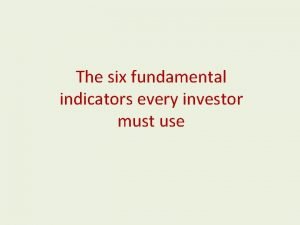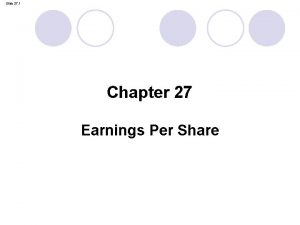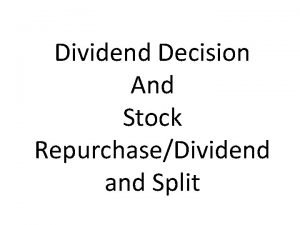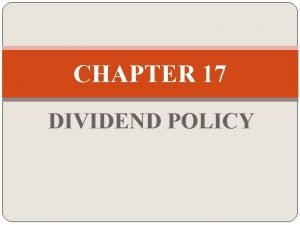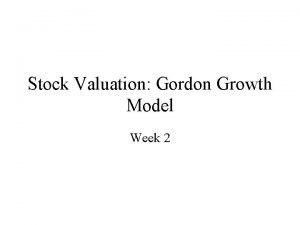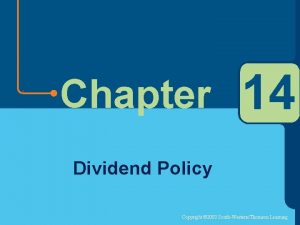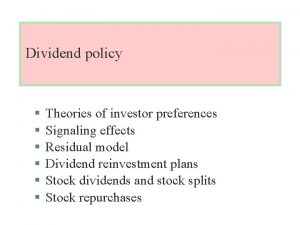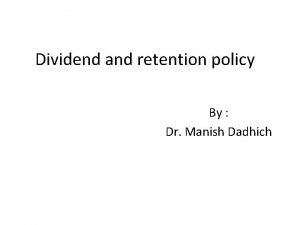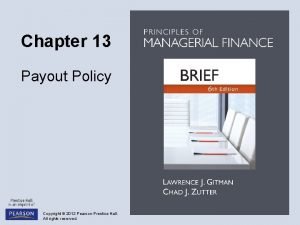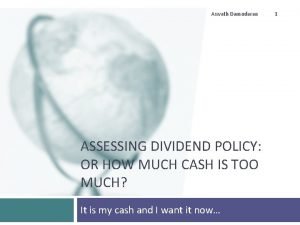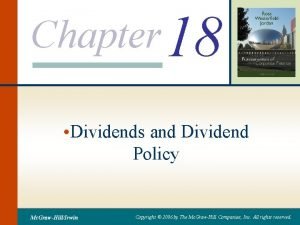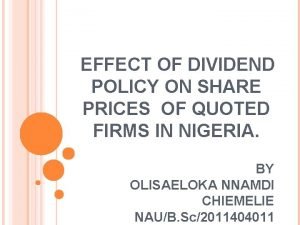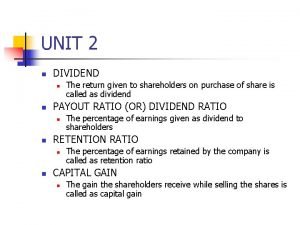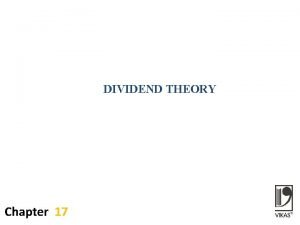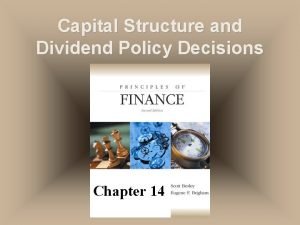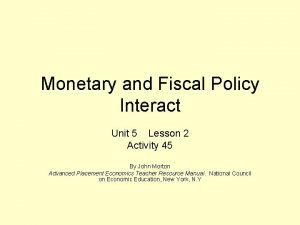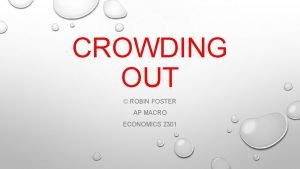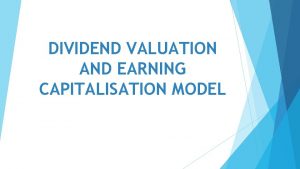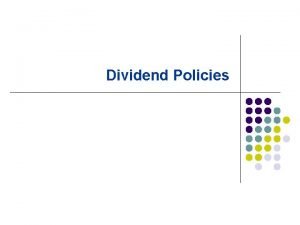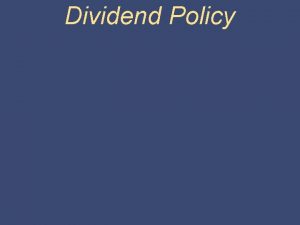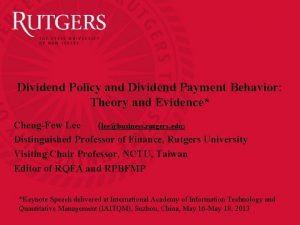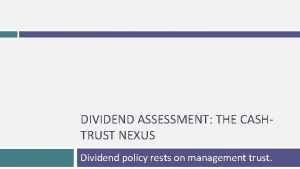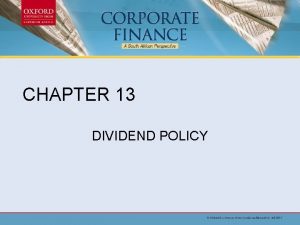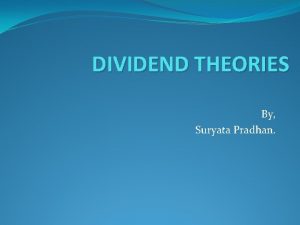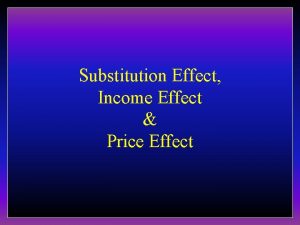EFFECT OF DIVIDEND POLICY ON SHARE PRICES OF






















- Slides: 22

EFFECT OF DIVIDEND POLICY ON SHARE PRICES OF QUOTED FIRMS IN NIGERIA. BY OLISAELOKA NNAMDI CHIEMELIE NAU/B. Sc/2011404011

BACKGROUND OF THE STUDY Dividend policy is the action program used by a firm to decide how much of its residual profits will be paid out to shareholders in dividends (Abubakar, 2011). The objective in choosing a dividend policy should be to maximize the value of the firm to its shareholders. Many dividend theories have been advanced and tend to explain how dividend decisions are arrived at and whether they have an impact on the value of a firm. Different approaches here include the dividend relevance group which believes that increase in dividend or paying out dividend increases the value of a firm and the dividend irrelevance group which believe that it has no effect on the value of a firm (Anupam 2012). the basic thrust of this paper is to examine the relationship between dividend policy and the market price of shares in the emerging capital market of Nigeria.

STATEMENT OF PROBLEM The issue of how much a company should pay its stockholders, as dividend is one that has been of concern to managers for a long time. Dividend policy has been analyzed for many decades, but no universally accepted explanation for companies observed dividend behavior has been established. Brealey and Myers (2005) described dividend policy as one of the top ten most difficult unsolved problems in financial economics. Modigliani and Miller (1961) demonstrated the irrelevance of dividend policy under a set of assumption but when these assumptions are relaxed, theory begins to collapse. This raises the question does dividend policy have any effect on the value of firms? If yes, to what extent?

OBJECTIVES OF THE STUDY The main objective of this study is to examine the effect of dividend policy on the share prices of quoted companies in Nigeria. This study will seek to specifically determine the following: The effect of dividend per share on the market price of shares. The effect of dividend payout on the market price of shares. The effect of dividend yield on the market price of shares.

SIGNIFICANCE OF THE STUDY This study on the effect of dividend policy on the market prices of shares is crucially important to the corporate financial management and governance of both public and private companies in Nigeria. It would be of immense benefit to corporate financial managers, investors, shareholders and to students and researchers in the field of corporate finance.

SCOPE OF THE STUDY this study focuses on the possible effects the dividend policy formulated by a company may have on the market price of its shares. the study was conducted in Nigeria and it made use of data obtained from selected public companies which are quoted on the Nigerian stock exchange. This study is therefore based on the corporate dividend practice in Nigeria and how it affects the market value of quoted Nigerian companies.

CONCEPTUAL FRAMEWORK- DIVIDEND POLICY Dividend policy is the action program used by a firm to decide how much of its residual profits will be paid out to shareholders in dividends (Abubakar 2011). The questions which relate to the dividend policy of a firm are: What are the preferences of shareholders? Do they want dividend income or capital gains? What are the financial needs of the company? How much should be paid out as dividends? What are the constraints on paying dividends? Should the company follow a stable dividend policy? What should be the form of dividends? It is not easy to answer these questions. A number of factors will have to be evaluated to analyze each of these questions in order to evolve a long-term dividend policy for the firm.

CONCEPTUAL FRAMEWORK- SHARE PRICE MOVEMENTS In financial markets, a share is a unit of account for various investments. It often means the stock of a corporation, but is also used for collective investments such as mutual funds, limited partnerships, and real estate investment trusts. A share price is the price of a single share of a company, derivative or other financial asset. In layman's terms, the stock price is the highest amount someone is willing to pay for the stock, or the lowest amount that it can be bought for (Wikipedia, 2015). According to (Afolabi and Dada, 2014) the factors which influence the prices of shares on the stock exchange are as follows: internal factors, external factors, industry related factors, economic related factors, political factors and volume of trading. Akinsulire (2008) also identified some distinct factors affecting pricing in the secondary market, they include; market forces, market hearsay, corporate performance, economy and government policy.

THEORETICAL FRAMEWORK On the relationship between dividend and the value of the firm, different theories have been advanced. These theories can be grouped into two categories: Theories which consider dividend decision to be irrelevant (dividend irrelevance theories); and Theories which consider dividend decision to be an active variable influencing the value of the firm (dividend relevance theories). Dividend relevance theories: Walter’s model, Gordon’s model, Bird in hand theory, Signaling theory, Clientele effects theory and Agency theory. Dividend irrelevance theories: Modigliani and Miller’s theory.

EMPIRICAL FRAMEWORK Modigilliani and Miller, in their classic article on dividend policy were of the opinion that dividend policy has no effect on the market price of shares. On the other hand, several other scholars such as Walter (1959), Gordon and Shapiro (1962), Linter (1956) and Kirshman (1963) were of the opinion that dividend policy has a positive influence on the market prices of shares. Their arguments are supported by more recent empirical studies of scholars such as: Asghar et al (2011), Naser et al (2013), Murekefu and Ouma (2012), Ramadan (2013), Khan (2012), Ozoumba et al (2013), Illaboya and Aggreh (2013) and Bougatef (2014). However, Black (1976) opined that the issue of dividend policy still remains an unsolved puzzle on which no final empirical conclusion exists. In his words, he stated as follows “we are presently unable to show that dividends matter, but we are not willing to assert that dividends definitely do not matter”. His argument was supported by Brealey & Myers (2005) and Husan. Adin et al (2010).

GAP IDENTIFICATION It is noted that researchers have focused mainly on developed markets, while little or no attention has been paid to dividend policy in emerging markets. The findings of the developed economies may not be directly applied to developing economies like Nigeria due to differences in regulations, culture, environment and nature of investors. Hence, this study has come to fill this gap and to examine the effect of dividend policy on the share price of companies quoted on the Nigerian stock exchange.

METHODOLOGY- RESARCH DESIGN, POPULATION, SAMPLE SIZE & DATA SOURCES This research work employed the Ex Post Facto research design. The importance of Ex-Post Facto research is that it is a realistic approach to solving business and social science problems which involves gathering records of past events (Agbadudu, 2002). The research population is comprised of all companies quoted on the Nigerian Stock Exchange. There are currently 194 listed companies and 24 industrial categories on the Nigerian Stock Exchange. In this study, a total of 17 listed firms operating in high profile industries in the Nigerian stock exchange were selected using the judgmental sampling technique. This represents 8. 76% of the total population. This is consistent with the propositions of Krejcie and Morgan (1970) where a minimum of 5% of a defined population is considered as an appropriate sample size in making generalization. The data used in this study were gathered from secondary sources. Secondary data are reliable, easy to understand are of descriptive models. The secondary data used were extracted from the published annual reports and financial statements of the selected firms for relevant years sampled for analysis and from Fact-books of the Nigerian stock Exchange.

METHODOLOGY- MODEL SPECIFICATION This study consists of three models specified as follows: To test the effect of Dividend per share on Market price per share : MPS= α + βDPS + ε ……… (1) To test the effect of Dividend payout on Market price per share : MPS= α + βDPO + ε………. (2) To test the effect of Dividend yield on Market price per share: MPS= α + βDY + ε………… (3)

METHODOLOGYMETHOD OF DATA ANALYSIS The empirical data collected for the study were summarized and presented in tables using the descriptive statistical method. The hypothesis formulated in the chapter one of this research study were either to be accepted or rejected after being tested using the simple linear regression technique with the aid of the SPSS (Statistical Package for Social Sciences) version 21 software. Decision rules were made based on the P-value (i. e. significant value) of each hypothesis, tested at a 95% confidence interval. Decision rule: Accept Ho if P-value > 0. 05 otherwise, reject Ho.

DATA PRESENTATION & ANALYSIS The data used in this research were extracted from the published annual reports and accounts of the seventeen firms sampled in this study and from Fact-books of the Nigerian Stock Exchange and some stock market websites. The variables for which data were collected are: dividend per share, earnings per share and stock prices as at the end of the year. Dividend payout and dividend yield ratios were also computed from the data collected. The data were collected for the seventeen firms sampled over the eight year period (2006 -2013). The stock price data, dividend per share, earnings per share, dividend payout and dividend yield data are presented in appendices I, III, IV and V respectively. Simple linear regression models were adopted to test the effect of the dividend variables (Dps, Dpo&Dy) on share price.

DESCRIPTIVE RESULTS N Minimum Maximum Mean Std. Deviation DPO 136 -5. 83 2. 88 . 5554 . 68167 DPS 136 . 00 20. 00 2. 3956 3. 22601 DY 136 . 00 . 41 . 0420 . 04121 EPS 136 -. 51 28. 08 4. 0930 4. 79506 MPS 136 1. 46 1200. 00 76. 9653 135. 39639 The descriptive statistics result reveal that the distribution of stock prices (MPS) has a mean value N 76. 96 with a standard deviation of N 135. The distribution of earnings per share (EPS) has a mean value of N 4. 09 and a standard deviation of N 4. 79. The distribution of dividends per share (DPS) has a mean value of N 2. 39 and a standard deviation of N 3. 22. The distribution of dividends yield (DY) has a mean value of 0. 042 (4. 2%) with a standard deviation of 0. 041 (4. 1%). The distribution of dividends payout (DPO) has a mean value of 0. 55 (55%) with a standard deviation of 0. 68 (68%).

TEST OF HYPOTHESIS ONE STATEMENT OF HYPOTHESIS Ho: dividend per share has no significant effect on the market price of shares. TABLE 4. 2. 1: SUMMARY OF REGRESSION RESULTS R 0. 870 R-SQUARE 0. 757 F-STATISTICS 416. 448 T-STATISTICS 20. 407 SIG. VALUE (P-VALUE) 0. 000 DECISION The P-value of 0. 000<0. 05 significance level affirms that dividend per share impacts positively on the market price per share of quoted companies in Nigeria. We therefore reject the null hypothesis while accepting the alternate and conclude that dividend per share has a positive and significant effect on the market prices of shares of companies quoted on the Nigeria Stock Exchange.

TEST OF HYPOTHESIS TWO STATEMENT OF HYPOTHESIS Ho: dividend payout has no significant effect on the market price of shares. TABLE 4. 2. 2: SUMMARY OF REGRESSION RESULTS R 0. 095 R-SQUARE 0. 009 F-STATISTICS 1. 217 T-STATISTICS 1. 103 SIG-VALUE (P-VALUE) 0. 272 DECISION The P-value of 0. 272>0. 05 significance level indicates that there is no significant relationship between dividend payout and market price per share. Therefore, we accept the null hypothesis and conclude that dividend payout ratio does not have a significant effect on the market price per share of quoted firms in Nigeria.

TEST OF HYPOTHESIS THREE STATEMENT OF HYPOTHESIS Ho: dividend yield has no significant effect on the market price of shares. TABLE 4. 2. 3: SUMMARY OF REGRESSION RESULTS R 0. 132 R-SQUARE 0. 017 F-STATISTICS 2. 382 T-STATISTICS -1. 543 SIG-VALUE (P-VALUE) 0. 125 DECISION The P-value of 0. 125>0. 05 significance level indicates that there is no significant relationship between dividend yield and market price per share. Therefore, we accept the null hypothesis and conclude that dividend yield does not have a significant effect on the market price per share of quoted firms in Nigeria.

SUMMARY OF FINDINGS The major findings obtained from this study are as follows: Dividend payment by quoted companies in Nigeria has a significant and positive effect on their share prices. This implies that investors on the Nigerian Stock Exchange favor companies that pay dividends over companies that do not. This finding supports the argument of dividend relevance propounded by Walter (1959), Gordon and Shapiro (1962), Linter (1956) and Kirshman (1963) and supported by more recent empirical studies of scholars such as: Asghar et al (2011), Naser et al (2013), Murekefu and Ouma (2012), Ramadan (2013), Khan (2012), Ozoumba et al (2013), Illaboya and Aggreh (2013) and Bougatef (2014). Dividend payout of quoted companies in Nigeria does not have a significant effect on their share prices. This implies that the manner in which the total earnings of a company are shared between dividend payment to shareholders and retention for future growth and expansion of the company does not significantly affect the share prices of quoted companies in Nigeria. This finding supports the argument for dividend irrelevance propounded by Modigliani and Miller (1961) and supported by some other scholars such as: Brealey & Myers (2005) and Husan-Adin et al (2010). Dividend yield of quoted companies in Nigeria does not have a significant effect on their share prices. This implies that the rate of dividend return on share prices does not significantly influence the share prices of companies quoted on the Nigerian Stock Exchange. This finding also supports the argument for dividend irrelevance propounded by Modigliani and Miller.

CONCLUSION AND RECOMMENDATIONS Based on the findings of this study, we conclude that dividend policy remains one of the significant financial policies influencing the share prices of companies quoted on the Nigerian Stock Exchange. From the findings of this study, we recommend the following: Directors and managers of joint stock companies in Nigeria should endeavor to pay dividends to shareholders regularly as this would normally signal that the company is performing well and is confident of profitable performance in future. Also, regular dividend payments by companies help to satisfy investors’ desire for dividend returns on their investments and it was empirically discovered in this study that investors value the shares of dividend paying companies higher than the shares of non-dividend paying companies. Companies should not payout an excessive proportion of their earnings as dividends especially when they have profitable investment opportunities. This is because if a company pays out most of its earnings as dividends it would not have sufficient earnings to retain for future growth and expansion of the business. Companies should pay attention to their earnings and profitability as this is a major determinant of their ability to make dividend returns to investors and investors also use them as a basis for measuring their performance and the value of their shares. Finally, directors and managers should endeavor to take into account several factors mentioned earlier in this study such as: the desires of shareholders and the financial needs of the company before formulating an appropriate dividend policy for their companies.

GREETINGS THANK YOU
 Fundamental indicators
Fundamental indicators Diluted earnings per share
Diluted earnings per share Dividend ex date
Dividend ex date Record date dividends
Record date dividends Gordon model of dividend policy
Gordon model of dividend policy Constant dollar dividend policy
Constant dollar dividend policy The residual theory of dividend policy asserts that
The residual theory of dividend policy asserts that Residual dividend policy advantages disadvantages
Residual dividend policy advantages disadvantages Walter model of dividend
Walter model of dividend Factors affecting dividend policy
Factors affecting dividend policy Dividend policy decision in financial management
Dividend policy decision in financial management Objectives of dividend policy
Objectives of dividend policy Vale dividend policy
Vale dividend policy Compromise dividend policy
Compromise dividend policy Factors affecting dividend policy
Factors affecting dividend policy Gordon model of dividend policy
Gordon model of dividend policy Payout ratio formula
Payout ratio formula Mm hypothesis dividend policy
Mm hypothesis dividend policy Compromise dividend policy
Compromise dividend policy Types of dividend policy
Types of dividend policy Dividend policy decision in financial management
Dividend policy decision in financial management Loanable funds graph recession
Loanable funds graph recession Crowding out effect macroeconomics
Crowding out effect macroeconomics
